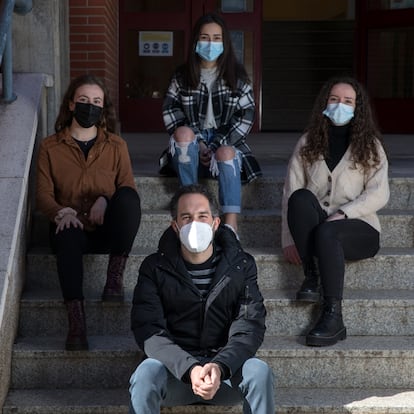The stairs of the public institute Aliste host an intense chat between teenagers.
A spring sun heats up a debate on aporophobia, refugees, human rights and prospects for the rural future as the bell decrees recess time.
The stampede of students makes the chairs and tables rattle before fleeing to the patio and outside the educational center of Alcañices (Zamora), a town of 1,000 inhabitants.
Three girls greet their colleagues as they explain how they have managed to turn the European Union (EU) red for “fomenting hatred” towards refugees.
The European Ombudsman has admitted these criticisms for a content on the official community website, already modified, which linked the waves of migrants with the terrorism suffered in recent years.
Esther Martín, María Pérez and Paula López are the only three economics students in the second year of high school.
They are so interested in the subject that the teacher, Chema Mezquita, manages to go beyond textbooks.
Last year they chatted about the European club and visited the History section of the EU website.
The page stated that given the recent arrival of refugees due to religious extremism and instability in Africa or the Middle East, "the EU not only faces the dilemma of how to deal with them, but is also the target of several terrorist attacks."
It screeched at them.
Even in those months of distance education, the small class agreed on the injustice of those words.
Paula López, 18, considers that "he put the cross" on this vulnerable group and claims that "the EU should represent us all."
Esther Martín, 17, emphasizes that these speeches focus on those who arrive by boat and not by plane: "It's aporophobia and racism."
The friends wanted to act and, first of all, get informed.
María Pérez, 18, emphasizes that to achieve changes it is not enough to “talk and debate”, but to intervene with arguments.
His partner Martín concludes: "We are not to read and shut up."
That is why the Declaration of Human Rights and the values promulgated by Europe were hatched.
The first complaint was directed to those responsible for the page, but there was no response.
Esther Martín, Maria Pérez and Paula López with their teacher Chema Mezquita, Victor Sainz
The complaints about this "offensive and discriminatory text against refugees and people of other religions" were referred to the European Ombudsman, without much faith, but with a clear conscience.
Until the award arrived: a few days ago they received in their email a message with the blue flag and yellow stars.
The EU admitted the mistake and turned the page in the 24 Community languages.
Now it says that “the EU faces the challenge of how to take care of them [the refugees] while safeguarding their well-being and respecting their Human Rights”.
They no longer refer to terrorism.
The Ombudsman, Lene Naesager, explained in her letter that the Commission services accepted that "the previous wording could be confusing."
"I am pleased to inform you that this text has been updated, in line with our editorial practice, in order to eliminate any possible conclusion that points to an association between refugees and terrorism," he added.
The girls celebrate that with an effort to combat inequalities there are results.
“With determination, things can be changed.
We do not need great politicians, even from an institute in [the region of] Aliste can be ”, they claim.
The teacher praises the "developed social thinking" of those Zamoranas who have asked him to go to the Congress of Deputies and with whom he has launched multiple projects.
The feminist posters that abound in the institute have these adolescents behind them, who jump when in their environment they hear a macho or homophobic comment.
Martín lists his concerns apart from the school: "The LGTBIQ + world, rural culture, feminism, refugees ...".
They lament the stigma that the towns are ignorant and argue that "rural is not only agriculture and livestock."
They have a few months left to go to university and they boast of rural education: "We are equally or more prepared."
Esther considers studying Law and Politics, Paula likes Psychology and María considers choosing Labor Relations.
They all assume that they will have to leave their villages, but they affect one nuance: having the ability to return.
They would not like a lack of benefits and services, such as healthcare, bank branches or a poor internet, to prevent them from choosing where to settle in the future.
"There are opportunities here, but if nobody takes advantage of them, they run out," they say.
They are terrified that this inequality continues to take hold and that they, this time, cannot do anything to prevent it.
You can follow EL PAÍS EDUCACIÓN at
and
, or sign up here to receive
our weekly newsletter
.


/cloudfront-eu-central-1.images.arcpublishing.com/prisa/WSGIPYQJ3ZBJBLTWACM5ZX2QGA.jpg)






